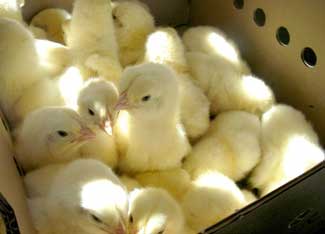
friends, not food.
Not all it’s cracked up to be— the quality of mainstream poultry in the U.S. is debatable given the barrage of enhancements it’s ramped up with and the constant gamble of possible contamination. Much is made of the value of the meat, but too often careless consumers don’t consider the lives of those animals before they adorned a dinner plate.
Two time Pulitzer Prize-winning author Nicholas D. Kristof wrote for The New York Times recently about the unfortunately widespread salmonella outbreak. His focus was not about addressing food, per se, but discussing instead the capabilities of the creatures the meat is derived from, calling the way factory farmed poultry is raised “inhumane.” And he would know. The esteemed author grew up on a farm and shared his harrowing experiences with the clever and beautifully emotional birds his own family raised and consumed.
“We tend to feel more sympathy for calves with large, cute eyes, but, as an Oregon farmboy,” Kristof writes, “I have to say that poultry are far from the nitwits we assume — and of the two-legged folk I’ve met over the decades, some of the most admirable have been geese. Even as a boy, I was struck that our geese mated for life, showing each other tenderness and support without obvious marital squabbles or affairs. If there are philandering geese, I have never met one.”
“….just as we try to protect dogs and cats from undue suffering, without necessarily considering them our equals, it makes sense to minimize animal suffering more broadly when we can. So even when there are no salmonella outbreaks, there are good reasons to keep away from wretched birds raised in factory farms.” Nicholas D. Kristof, in The New York Times
“The nobility of geese was most on display at execution time. My job as an 11-year-old when we beheaded the geese was to capture a bird and take it to the chopping block as my dad wielded the ax. So I would rush at the terrified flock and randomly grab an unlucky goose. The bird in my arms would honk in terror and try to escape, and the other geese would cower in the corner of the barn. Then one goose would emerge from the flock and walk tremulously toward me, terrified but unwilling to abandon its mate. It would waddle after me toward the chopping block, trying to honk comfort to its mate. Even as a child, I was awed. This was raw courage and fidelity — and maybe conjugal love, although it sounds hokey to say so — that made me wonder if these animals were actually our moral superiors.”
Kristof is ready to admit that perhaps his “farmboy recollections” are tinged with a sweet sense of anthropomorphism, but notes that even chicks can do basic arithmetic— if you shuffle five items in a shell game, they mentally keep track of additions and subtractions and choose the area with the higher number of items. Chicks actually fare better than toddlers in these type of tests.
Chickens also communicate with different calls to signal a warning that ground predators or birds of prey are near, and also call to signal food. Masters of multi-tasking, a chicken’s right eye looks out for food, while the left watches for predators and potential mates. Kristof writes that hens are social animals, “preferring the companionship of those they know to strangers.” They also recover more quickly from stress when they are with an acquaintance.
“Just because they don’t have big brown eyes doesn’t mean that they should be condemned to spend their lives jammed into tiny cages in stinking, fetid barns, with bodies of dead birds sometimes left rotting beside live ones,” he pleads. Couldn’t considering the emotional and intellectual capacity of these animals not only ease the moral dilemma of omnivores, but also improve the health and safety of the creatures we eat, thereby our own?
Educate yourself on the rigors of mainstream poultry farming practices in the U.S. to decide if easy access to cheap, often contaminated, chicken is worth the suffering of these animals, who by firsthand accounts are smart and sentient, must endure before becoming your dinner. — Casandra Armour











-300x169.jpg)




